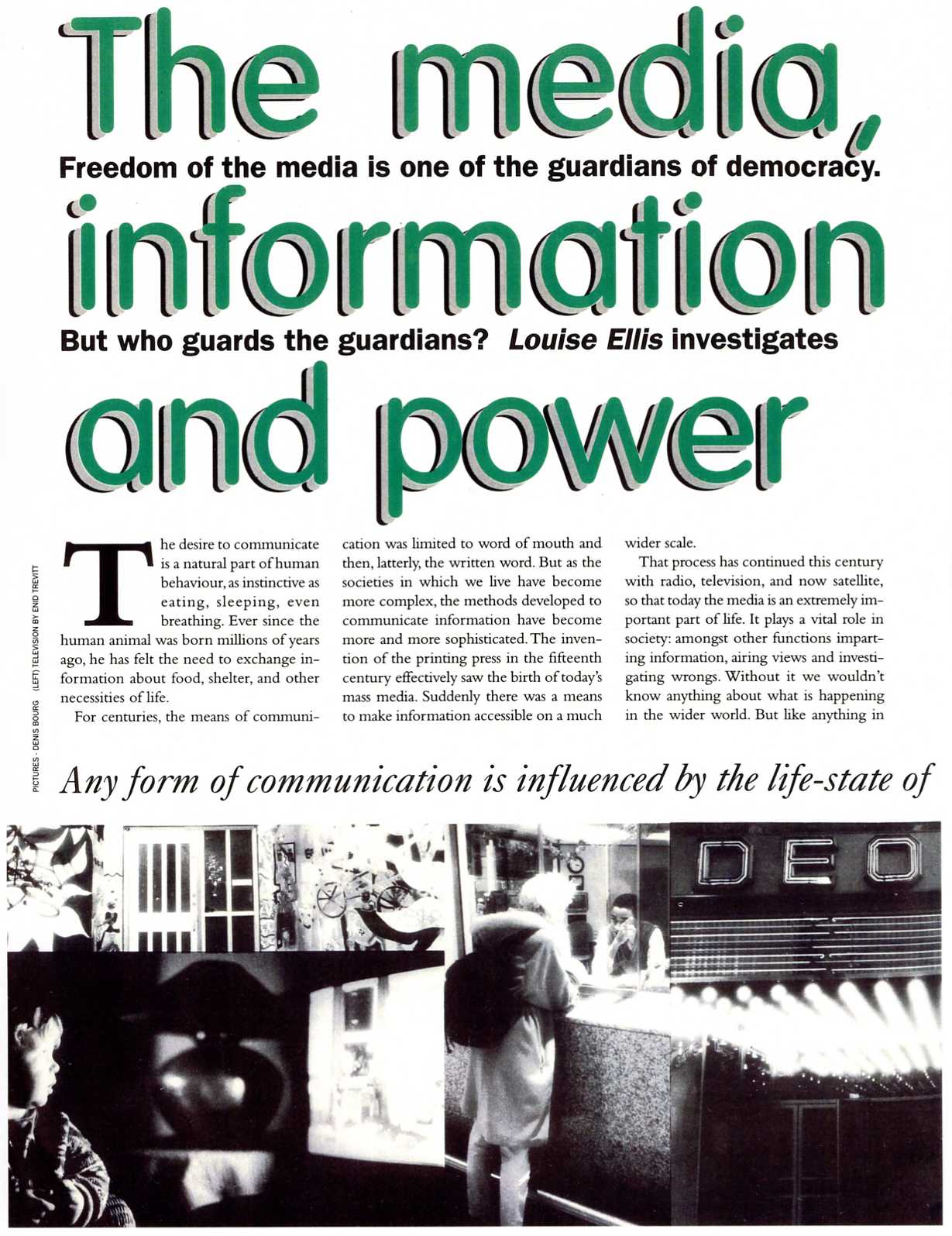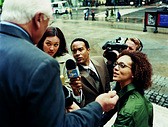
Welcome to the ezine produced by SGI Buddhists that prompts the positive, kindles the constructive, highlights the hopeful and leaves you feeling - well, up!


In the light of the Leveson inquiry into the tabloid phone hacking scandal, an article I wrote several years ago on Buddhism and the Media is worth reading again, writes Louise Ellis.
The media has changed dramatically in the last ten years, with the arrival of the digital age.
Blogging, u-tube and social networking sites have ripped apart the traditional world of newspapers, radio and TV, putting control of information firmly into the hands of the people.
However, whether information comes from a blog, or a broadsheet newspaper, the crucial need for ethics and integrity is still a serious issue.
As the Leveson Inquiry into phone hacking at the tabloids makes clear, we live in a culture where information can be used to manipulate and control, for profit and for power, with callous disregard for the lives of the people involved.
Author J.K. Rowling told the inquiry about her own experiences of press intrusion. She described the Press Complaints Commission as toothless – “a wrist slapping exercise at best” – and called for a body to impose sanctions.
However, her concerns about the dangers of state control have been echoed by both witnesses and commentators.
Graham Foulkes, the father of a 7/7 victim whose phone was allegedly hacked, told the Times (Saturday, November 26th) that he had “great concerns” that the inquiry would result in “knee-jerk” legislation that would lead to control of newspapers by politicians who have been exposed by the press.
BBC Trust chairman Lord Patten, speaking at the Society of Editors Conference, earlier this month, said, "Free speech... would truly be damaged if a single group of people, beholden to and perhaps even appointed by politicians, were to have the power to decide what should or should not be published."He called for some kind of self-regulatory code of behaviour akin to the Hippocratic Oath.

I wrote an article over 15 years ago for the SGI-UK Buddhist magazine, the UKE, (now called the Art of Living), entitled, The Media, Information and Power, questioning who is guarding the so-called guardians of democracy.
The examples used are dated… However, the fundamental causes at the core of this debate are as true today, as in 1996, when this article was first published.
Here is the full text of the article:
The desire to communicate is a natural part of human behaviour, as instinctive as eating, sleeping, even breathing. Ever since the human animal was born millions of years ago, he has felt the need to exchange information about food, shelter, and other necessities of life.
For centuries, the means of communication was limited to word of mouth and then, latterly, the written word. But as the societies in which we live have become more complex, the methods developed to communicate information have become more and more sophisticated. The invention of the printing press in the fifteenth century effectively saw the birth of today’s mass media. Suddenly there was a means to make information accessible on a much wider scale. That process has continued this century with radio, television, and now satellite, so that today the media is an extremely important part of life. It plays a vital role in society: amongst other functions imparting information, airing views and investigating wrongs. Without it we wouldn’t know anything about what is happening in the wider world. But like anything in our environment, its value lies in how we use it. And to do that wisely, we need to understand what it is and how it works.
Trust
People tend to trust the information that they find out from the media. The fact that a story appears in print or on our TV screens gives it a weight and importance that suggest it must be an accurate picture of reality, that it must actually be true.
But this is not always the case. If you look inside any newsroom, what you first see is people ‘making the news’: writing a newspaper story, or editing a radio interview or some video pictures. It is those people who intervene to package and present the picture of reality to their audience.
Mass communication at root is no different to communication on a one-to-one level. It suffers the same potential for misunderstanding and distortion, and not necessarily with the conscious intention of deceiving. Any form of communication is influenced by the life-state of the person giving, and the person receiving, the information.
Nichiren Daishonin’s Buddhism teaches that everything we say and do is affected by which of the Ten Worlds, from Hell through to Buddhahood, is dominant in our lives. A journalist dominated by Animality, for example, might be more keen to champion the causes of the powerful over the weaker sections of society, and find it difficult to see point of balance between the two.
In the same way, those receiving the information will filter it through their dominant life-state: if it is Animality operating in a similar way, then they might find themselves agreeing with the journalist: if it is Anger such a story might prompt great feelings of outrage and urge them to fight for greater justice in the world.
operating in a similar way, then they might find themselves agreeing with the journalist: if it is Anger such a story might prompt great feelings of outrage and urge them to fight for greater justice in the world.
The problem with the media is that we are put in the position of having to trust people we don’t personally know to tell us information about events and places we have absolutely no experience of. It can be hard to gauge how correct the information is, and how much it has been ‘coloured’ by the views of the people presenting it.
SGI President Ikeda points out the dangers of this in his dialogue with the historian, the late Arnold Toynbee:
Since the influence of mass communication is vast, they are constantly accompanied by the danger that they may become tools for manipulating the people. Furthermore, even if such manipulation is unconscious, mass communication nonetheless contribute to the formation of world views and to he slanting of those views in one direction or another.(The Toynbee-Ikeda Dialogue, p.141)
But should we blame the media for giving us a biased version of events? Or is it naïve of us to believe that the media can give the ‘whole’ truth when, in most cases, practical limitations on news gathering means that the media picture can only ever be part of reality?
Practicalities
Without any thought of ‘bias’, the journalist is already faced with restrictions of time and space which will naturally limit his or her ability to gather information about an event. An important part of a reporter’s training is accuracy, and getting both sides of the story.
But they are not superhuman, and aren’t necessarily psychic either! They have to rely on other people, such as experts, press officers or eyewitnesses, for the information. White reporters will do their best to get as much accurate information as possible, the complexity of any situation means that it is possible that there is something that they don’t uncover.
So, even if the journalist has a completely ‘pure’ mind, with no personal prejudices or beliefs affecting his perception of a situation, it would still be difficult to get a complete picture of reality.
In the same way, it would be easy to assume that the events reported are the only important things happening in the world. But, once again, there are limits on information coming into a newsroom, and decisions are made as to which stories are important.
Information comes from a number of sources, which include the policy, fire brigade and courts, press officers and organisations, press agencies and freelancers who are experts on what is happening in their particular area. There are also chance calls from members of the public. Journalists also ‘feed off’ each other a lot, with newspaper reporters watching the news, and TV news editors reading all the day’s newspapers.
Bad news
The uniformity of information sources tends to contribute to a consensus of opinion on which events are ‘important’ news. And this consensus can include the tendency to view ‘bad news’ as more important than ‘good news’.
Living as we do in an age when what Buddhism calls ‘the three poisons’ of greed, anger and stupidity are rife, it is not surprising that so many journalists take a cynical approach to world events. In questioning the outcome of any situation it is held to be more realistic to predict with pessimism, than with optimism.
A good example of this is the media coverage of the elections in South Africa last April. Until almost the last moment, news reporting concentrated on the violence between the various factions, and as the date for the poll approached most commentators took an increasingly gloomy view. Would the election go ahead? Would the country descent into bloody civil war?
It therefore came as a great surprise to the vast majority of those reporting on events that a pre-election accord was reached between the rival parties, that the election was overwhelmingly peaceful and ordered, and that there was a smooth transfer of power to the new government.
In Buddhism, the attitude where one assesses the present and future from a past perspective is described as honga’myo, meaning ‘from this moment back’. If the past has been bleak, the present and future must be bleak, too. Pessimistic coverage can feed the seeds of hopelessness in everyone absorbing the news, and can create the feeling that nothing ever changes for the better.
By contrast, Buddhism encourages the adoption of a spirit of honnin’myo, meaning ‘from this moment forwards’. This attitude refuses to be dominated by what has happened in the past, but takes a fresh look at the future, based on the universal law of cause and effect which implies that every moment offers the change of making a new beginning.
‘Infotainment’
Another influence at work is the desire to make the story ‘exciting’ and entertaining for its audience. For example, television coverage of the 1984 miners’ strike was criticised for making too much use of pictures of picket-line violence, rather than showing the more ‘boring’ images of union meetings which showed the causes behind the strike.
In their defence, news editors argue that without arresting images people are like likely to pay attention to the story, let alone any analysis of the issues involved. However, as President Ikeda points out, there is a danger in TV pictures influencing people through the vividness of images:
If the television camera, trained on a clash between radical students and the police, show the violent attack of a wild-eyed student virtually leaping from the camera into the living room, the viewer is likely to look critically on these young people. If, however, the camera shows the police using weapons to quell students, sympathy will probably flow in the other direction. (op.cit., p. 145)
 Information is also manipulated by the people ‘behind’ the news, who have learnt the value of having ‘media-friendly’ interviewees. They realise that media coverage is the best form of publicity one can get, and it’s free! Some organisations now train people not just to look and sound good in interviews, but to bend the interview to give the information they want. Many organisations use stunts, or involve celebrities, to get the media’s attention. So in this sense news can be created by people seeking a platform for their views.
Information is also manipulated by the people ‘behind’ the news, who have learnt the value of having ‘media-friendly’ interviewees. They realise that media coverage is the best form of publicity one can get, and it’s free! Some organisations now train people not just to look and sound good in interviews, but to bend the interview to give the information they want. Many organisations use stunts, or involve celebrities, to get the media’s attention. So in this sense news can be created by people seeking a platform for their views.
The situation becomes even more complex when one looks at the bias of newspaper owners. Newspapers are viewed as commercial enterprises and are completely free to show political allegiance or champion the rights of certain sections of society. Newspaper magnate Lord Northcliffe, who owned The Daily Mail, once said:
God made people so that I could fill their brains with facts, facts, facts – and later tell them whom to love, whom to hate and what to think (quoted in Investigating the Media by Paul Trowler, p. 33).
The only limits on newspapers are the laws of the land, such as trespass and nuisance, libel laws, and the Official Secrets Act. As long as they operate within these laws (or can pay off a libel suit), they can publish whatever they life. Nowadays a lot of people think newspapers overstep the mark, going to extreme lengths, for example, to dig up dirt on people in the public eye.
In political matters, they make their allegiance very clear, particularly during election campaigns. In this country there are many more newspapers which support the Conservative Party than the Labour Party, particularly among the tabloids. As John Lloyd comments in Index on Censorship:
Of the eleven national (UK) dailies, seven are owned by four companies. Of the nine national Sundays, four are owned by two companies … While it is true that writers and commentators of the left find space in the papers of the right, and it is also true that much reporting in the broadsheet papers is accurate and full, the dominant tone is right of centre.(quoted in Censorship, by Christian Wolmar, p.14)
Press barons who own the companies tend to own a variety of media outlets, including publishing, broadcasting and cinema, so their influence is far reaching. For example, Rupert Murdoch’s company, News International, owns The Sun, The Times, The Sunday Times, Today, The Times Educational Supplement, The News of the World and BSkyB in this country, as well as newspapers and TV stations in Europe, Australia and the United States. Such concentration of media power in the hands of very few owners makes many people feel distinctly uneasy, because of the potential for manipulation.
Regulations
Unlike the press, there are various rules and regulations in the UK that the broadcast media have to conform to. These are set up in the BBC’s charter and in the franchise agreements under which the ITV companies operate. The regulations state that channels have to include certain types of programme in their schedule, such as religious and social action programming. They also state that the broadcasting media have to be politically impartial.
Although technically independent, the Government has kept control over broadcasting. It appoints the members of the BBC’s Board of Governors and the Independent Television Commission (formerly the IBA), which monitors the output of ITV and Channel 4. (There are fewer rules governing satellite and cable TV).
In the mid-1980s there were several notorious disputes between the Government and broadcasters. Programmes such as the BBC’s ‘Maggie’s Militant Tendency’, about alleged extreme right-wing infiltration of the Conservative Party; its ’Real Lives’ series, which profiles a member of Sinn Fein; and ITV’s ‘Death on the Rock’, about the shooting of IRA members in Gibraltar, all showed the Government intervening (or trying to intervene) directly in broadcasting matters.
In 1988, the Government was again heavily criticised for its attempt to ban the broadcasting of Sinn Fein spokespersons on radio and TV. This type of censorship was seen in some quarters as a direct attack on the freedom of expression and the public’s right to hear both sides of the story, and led to what many people felt was the ludicrous situation in which the words of Sinn Fein members were voiced-over by actors with Irish accents.
Government secrecy
The Government’s most effective tool to silence comment in the media is the Official Secrets Act, which makes all government, military and police information secret unless specifically labeled as ‘not secret’. Even the colour of a cabinet minister’s carpet is technically secret, because no one has actually declared it not to be. The late Richard Crossman, formerly a Labour cabinet minister, once called secrecy ‘the British disease’.
This attitude is in direct contrast to the USA, where the US Freedom of Information Act makes all state information available (in theory, at least). If the US government wishes to withhold information from the public, then it has to give a good reason for it. There are growing demands for the reform of the Official Secrets Act, to bring the UK into line with other Western countries.
President Ikeda has spoken of the importance of getting rid of government secrecy:
It is undesirable, even dangerous, for states to engage in confidential enterprises that must be kept secret from the people and from other nations. The state ought to be a public utility; therefore, I think that it must not have secrets under any circumstances. In fact, the people must explode national secrets and courageously and watchfully see to it that governments do not lead them along dangerous paths.(op.cit., p.145)
Choice and competition
By it’s very nature, then, whether consciously or unconsciously, there is an element of bias in the media. In many cases, people are aware of that bias and choose a newspaper or TV programme which reflects their own views. In this country there is a good selection of newspapers, magazine and TV programmes. And in some senses choice is expanding, particularly in the broadcast media, with cable, satellite and new radio stations.
Each media outlet is in competition with the others to get viewers, listeners and readers. So while there may be  internal reasons to present information in a certain way, what continues to be extremely important is the circulation and viewing figures: if the audience doesn’t like what it is getting, it will change newspapers or switch channels. If it doesn’t do this, then it obviously likes what it is being fed.
internal reasons to present information in a certain way, what continues to be extremely important is the circulation and viewing figures: if the audience doesn’t like what it is getting, it will change newspapers or switch channels. If it doesn’t do this, then it obviously likes what it is being fed.
We do have freedom of choice, and we use it. The most popular daily paper in this country is the tabloid, The Sun, with a circulation of some 4 million, which is roughly ten times higher than that of the broadsheet, The Guardian.
Roy Greenslade, former editor of The Sun, has said:
The Sun sells more copies a day than any other (UK) newspaper … people enjoy its entertainment … it’s won its place in the market place by providing the kind of material people wish to read … if people wish to read it presumably they enjoy having their prejudices reciprocated. ((quoted in Investigating the Media, P.40)
John Whale, journalist and former Independent Television News correspondence, supports this view:
The Press is predominantly conservative in tone because its readers are. If any substantial number of people seriously wanted the structure of society rebuilt from the bottom, [the Communist paper] The Morning Star would sell more copies than it does. (ibid p.39)
Responsibility
These comments place responsibility fairly and squarely back in the hands of the people. And this accords with the philosophy of Nichiren Daishonin’s Buddhism, which teaches that our environment reflects us exactly, even though we don’t always want to admit it.
In the Gosho On Attaining Buddhahood, Nichiren Daishonin says:
… if the minds of the people are impure, their land is also impure, but if their minds are pure, so is their land. There are not two lands, pure and impure in themselves. The difference lies solely in the good or evil of our minds. (Major Writings, Vol 1,p.4)
This means that the media we have at present is bound to reflect the predominant attitudes held by people in this country at the moment. However, this does not absolve the media of responsibility. They can also lead, and not follow.
The three poisons of greed, anger and stupidity that are at work in our own lives are no different from the three poisons displayed by the media. If The Sun publishes a sleazy story about a member of the Royal family, it does so because it knows that that edition will earn more than enough money to pay for a libel suit. It knows that a good percentage of the British population will rush out and buy that paper, to get its dose of titillation.
There have been moved to curb the powers of the press with new privacy laws to protect the individual from the scurrilous activities of the ‘gutter’ press. But so far these have been shelved; because it was felt they could become counter-productive, and instead be used as a weapon against investigative journalism by people wanting to hide important information from the public.
Rights and respect
In another extract from his dialogue with Arnold Toynbee, President Ikeda says: ‘The mass communications media must consistently protect the rights of the people and deliver their new from the viewpoint of respect for life’
Buddhism teaches that we have to look at our own attitudes before we criticize the actions of others. This is because it is only through changing ourselves that we can also truly affect our environment. There is no point in criticizing the Press for bias and negativity, for instance, if our own lives are full of prejudice and disrespect.
Once one begins to have more respect for one’s own life and environment, it follows on that one will want to know about the more serious issues affecting our country. The desire to buy newspapers only to read about scandal and gossip is a type of escapism, which comes in part from feeling that one has no control over life. But Buddhism teaches that we do not have control over our lives, both individually and in a wider social context.
Through chanting Nam-myoho-renge-kyo to bring out our Buddhahood, we are activating the attributes of wisdom, compassion and courage. We need wisdom to see through the words of the media and gain a clearer picture of what is going on. We need compassion to care about the world around us, and so want to know what is happening in it. We need courage to stand up and say what we think. And we also need the life-force that chanting brings to persevere long enough to make a difference.
The ‘media professionals’ value their audience – us. They know our views are important, because we keep them in business. Apart from deciding which newspaper to buy, there are many avenues for people to make their voices heard, from simply ringing up the media with a story, to making a complaint to the Press Complaints Commission about inaccuracy in a report. If the media is seen as some sort of an elite body, then it will stay that way, and do as it pleases. But the more people who do adopt an ‘active’ stance, the more voices will be heard.
The value of anything in our environment depends on how we use it. We determine the value of the media. As Nichiren Daishonin says in the Gosho The Swords of Good and Evil:
You have offered this sword to the Lotus Sutra. While you wore it at you side, it was an evil sword, but now that it has been offered to the Buddha, it has become a sword for good, just like a demon who professes Buddhism. (Major Writings, Vol 1, p.124)
Louise Ellis is a journalist with experience in the press, radio and television.
Bibliography
ArnoldToynbee and Daisaku Ikeda.
The Toynbee – Ikeda Dialogue,
(Kodansha International Publishers, 1984)
Paul Trowler.
Investigating the Media.
(Collins Educational, publishers, 1988)
Christian Wolmar.
Censorship.
(Wayland, publishers, 1990)

